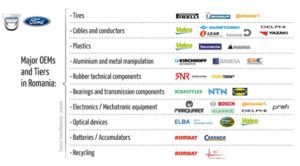August’s SMMT International Newsletter features guest writer Emanuela Cristescu, Trade Development Adviser at the Department for International Trade in Bucharest.
With more than 80 years experience, the Romanian automotive industry was valued at 30 bn. EUR in 2019 and has been on an upward scale for years with a contribution of 14% in GDP and 26% in exports. Hosting 2 OEMs: Renault Dacia and Ford and benefitting from foreign investments from companies like Daimler and Bosch, the industry represents one of Romania’s most important economic drives, of national interest.
Romania produces a wide range of automobiles, minivans, utility vehicles, buses, and trucks. Total car production reached 438.107 units in 2020. The industry is concentrated in cities such as Pitesti, Craiova and Brasov.
Competitive advantages of the industry car in Romania can be briefly summarized in:
- A range of modern vehicles and engines
- R&D and Innovation activities in Microelectronics, Mechatronics, Digitalization, Testing and validation of vehicles and components
- Human capital
- Collaboration with academic environment
- Competitive tax system, low energy cost
- Facilities for industrial and technological parks
- Availability of funding through state aid and EU funds
Renault Dacia is one of the top technologically developed companies in South-Eastern Europe. They are unique in the way of operating, giving that they cover the whole chain (design-engineering-testing-tooling-manufacturing-logistics-aftersales-sales-financing) through their 4 operation centres in the country.
Ford assemblies at Craiova Plant the EcoSport and Puma model, first hybrid car being assembled in Romania. They are also producing modern engines (ECO boost).
Romania has attracted not only car manufacturers, but also Tier 1 and 2 suppliers such as Bosch, Continental, Daimler, Federal Mogul Autoparts, Marquardt. Despite tough competition, there is demand for suppliers in the production of electric and electronic systems, tires, car seats, steering wheels, or plastic component manufacturers which creates a wide range of opportunities for Tier 1-3 British suppliers.
Moreover, Romania is known to be a major importer of second-hand cars. The national motor vehicles fleet is around 8M vehicles (2018) out of which 4,2 M are more than 9 years old. This creates opportunities for aftermarket sales and services.
As Carbon dioxide regulation is likely to continue to tighten, public authorities are making efforts to comply with EU recommendations. Decarbonizing of transport is one of the priorities of the current Government with increased focus for electrification development and future mobility technologies. Other SMART City solutions in demand are SMART parking, SMART lighting and energy efficiency related solutions.
Local companies are adapting to new trends and demand for know-how and innovative technologies is growing. We are actively promoting the leading role of the UK in future mobility by positioning the UK as their technical partner. Batteries are also a hot topic, i.e. ACAROM (Romanian Association of Car Manufacturers) initiated together with the Ministry of Economy a working group for the development of battery manufacturers for electric cars in Romania.
DIT Bucharest is keen to connect UK businesses with relevant stakeholders and to provide export and ODI assistance and support. Please get in touch to hear more about our activities and events.

Trade Development Adviser at the Department for International Trade in Bucharest.
Contact: Emanuela.cristescu@fcdo.gov.uk









